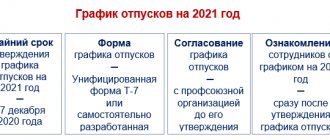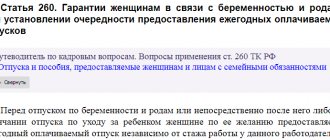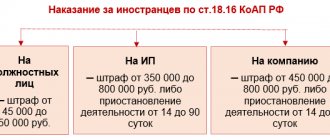Procedure for provision
In accordance with Art. 122 of the Labor Code of the Russian Federation, long rest is provided to the worker every year. When drawing up a schedule, it is not the calendar year that is taken into account, but the working year, which lasts 12 months from the date of entry to work at a specific enterprise. An employee’s first “vacation” right arises after six months of continuous work in one organization. By agreement of the parties, the employee has the right to take a long rest earlier.
In the future, the above-mentioned rule applies: each working year - one vacation (its duration varies depending on the category of worker, the minimum duration is 28 calendar days). Some categories of employees have benefits expressed in a longer duration of rest or preferential right to choose a vacation period; this must be taken into account when drawing up a schedule. Any violation of the right to rest is painfully perceived by employees and causes numerous lawsuits against employers. To prevent such violations, the Labor Inspectorate strictly monitors the relevant personnel documentation and punishes if it is completed incorrectly.
The Code of Administrative Offenses of the Russian Federation establishes the fine for the absence of a vacation schedule: this document must be drawn up every year no later than December 15.
Why is a vacation schedule necessary?
The vacation schedule is one of the most important documents in personnel records management, allowing qualitative regulation of employee vacation periods taking into account the needs and capabilities of the organization, while complying with the norms of labor legislation regarding the right of employees to annual rest.
There must be a vacation schedule where there is a team. The legal form in this case does not matter. This can be a legal entity (organization) or an individual (individual entrepreneur).
The vacation schedule is a unified form No. T-7, approved by Decree of the State Statistics Committee of the Russian Federation of January 5, 2004 No. 1, but in reality the organization has the right to independently decide to fill out the specified form No. T-7 or develop its own document form adapted for a specific organization .
Penalty table
How will they be punished for failure to provide a worker with vacation rights for more than two years in a row, what are the consequences of not having a vacation schedule or not paying vacation pay? The amount of the sanction is specified in Art. 5.27 of the Code of Administrative Offenses of the Russian Federation, which provides for punishment for any violation of labor legislation.
| Nature of the violation | Responsibility measures |
| Failure to provide leave | Legal entity: 30,000-50,000 rubles, for a repeat - 50,000-70,000 rubles. Official: 1000-5000 rubles, for repeated - 10,000-20,000 rubles, possible disqualification for officials for a period of 1 to 3 years. |
| Responsibility of the employer for the lack of a vacation schedule | The first time a warning is possible. The fines are the same as above. A micro-enterprise has the right not to have a schedule (the order of rest is established by agreements). |
| Failure to adhere to schedule | The same fines + compensation for moral damage (by agreement with the employee). |
| Non-payment of holiday pay | Administrative fines:
Criminal punishment for a manager: up to 120,000 rubles. - for partial non-payment; up to 500,000 rub. - for complete non-payment. |
As you can see, the amount of the fine for the lack of a vacation schedule is established by the Code of Administrative Offenses the same as for other violations relating to the rights of employees. The exception is non-payment of vacation pay: here the penalties are noticeably higher.
What to do if your boss won’t let you go on vacation
The employee’s right to rest is enshrined in the Constitution of the Russian Federation (Part 5, Article 37 of the Labor Code of the Russian Federation), and to ensure this right, the Labor Code obliges the employer to provide the employee with an annual paid rest of 28 days (Article 114 of the Labor Code of the Russian Federation).
To protect workers from the arbitrariness of the employer, the law provided for such a tool as a vacation schedule (Article 123 of the Labor Code of the Russian Federation). If a vacation schedule is drawn up, it is a mandatory document for both the employee and the employer. Therefore, if the vacation schedule provides for vacation from September 1, then the employer cannot refuse this vacation. And the employee is not even required to write a statement; the employer must notify him of the start of the vacation two weeks in advance.
Therefore, if your vacation schedule includes a vacation, but the employer does not even think about taking it out, remind him of this responsibility. Although you are not required to write a leave application, you can do so as a reminder.
If the employer has not issued an order to start vacation as scheduled, then the employee has the right to consider himself to be on vacation. As judicial practice shows, such an absence will not be considered as absenteeism. Of course, this is an extreme case. It is better to refer to Articles 123 and 114 of the Labor Code of the Russian Federation and convince the employer to provide leave.
Please note that Part 3 of Art. 124 of the Labor Code of the Russian Federation provides the opportunity, in exceptional cases, to postpone vacation to the next working year, when the provision of vacation to an employee in the current working year may adversely affect the normal course of work. In this case, the leave must be used no later than 12 months after the end of the working year for which it is granted.
Thus, if you have not been on vacation for 2 years in a row, this violation cannot be justified by any special cases. And the employer faces liability under Part 1 of Art. 5.27 of the Code of Administrative Offenses of the Russian Federation in the form of a fine of up to 50 thousand rubles. In this case, the employee can appeal to the labor inspectorate with a complaint about the employer’s unlawful actions or to the court with a request to oblige the employer to provide leave. The situation is somewhat more complicated if you ask for leave outside of the schedule. This can be done by submitting a written application to the employer. But the employer is not at all obliged to provide unscheduled leave at your request; he has the right to refuse to provide annual paid leave. An exception is made for some categories of workers, for example, pregnant women, minors, workers whose wives are on maternity leave.
Also note that the employer is obliged to pay for your vacation three days before it starts (Article 136 of the Labor Code of the Russian Federation), and before that it is still necessary to prepare personnel and accounting documents. Therefore, most likely, the employer will ask you to write a vacation application 4-5 days before it starts, and sometimes more. The law does not regulate this period. The main thing is that payment is received on time. Even if you agree to pay your vacation later, the employer will not take the risk, because this will be a violation and may be followed by a fine.
Therefore, if you need vacation urgently, it is better to write an application for leave without pay.
But this leave can only be obtained with the consent of the employer, except in certain cases (for example, in cases of the birth of a child, marriage registration, death of close relatives, if you are retired or disabled) (Article 128 of the Labor Code of the Russian Federation). Sometimes the employer does not have a vacation schedule at all. Then, in response to your request to provide vacation according to the vacation schedule, he refers to the absence of such a schedule. Lack of a schedule is a violation for which the labor inspectorate will certainly impose a fine of up to 50 thousand rubles. Therefore, it is better to invite the employer to draw up such a schedule, and if he refuses, contact the labor inspectorate or the court with a request to force the employer to draw up such a schedule. You can also contact both of these bodies.
The same procedure applies to additional leave (leave for work in the northern regions, for work in hazardous conditions, for irregular working hours).
A slightly different regime for study holidays. If you are studying part-time for the first time in a state-accredited program and have provided a certificate of invitation, then the employer cannot refuse to grant you study leave. If he does not issue a vacation in a timely manner according to your application and the provided summons certificate, you have the right to start this vacation yourself without his order, this will not be considered absenteeism. Failure to grant study leave is a violation that may also entail a fine under Part 1 of Art. 5.27 Code of Administrative Offenses of the Russian Federation.
Thus, if the employer does not allow you to go on your legal vacation, try to defend your right by indicating the articles of the law under which he is obliged to do this. And if that doesn’t work, you should contact the labor inspectorate or court.
Unlock access to the private part of Clerk with a Premium subscription. Get hundreds of webinars and online courses, unlimited consultations and other proprietary content for accountants.
Hurry up to subscribe with a 20% discount until October 15, 2021. Read more about “Premium” here.
Which employees have priority when taking leave?
The employer must keep in mind that a number of employees have a legal advantage in granting them annual leave:
| Category of workers | Special conditions | Normative act |
| Husband | Annual leave is granted while his wife is on maternity leave, regardless of the time of his continuous work with this employer. | Art. 123 Labor Code of the Russian Federation |
| Persons working in the Far North and equivalent areas | Full or partial combination of annual paid leave | Art. 322 Labor Code of the Russian Federation |
| Working parent (guardian, custodian) | Annual paid leave or part thereof (at least 14 calendar days) to accompany a child under the age of eighteen years old entering educational programs of secondary vocational education or higher education located in another area. If there are two or more children, leave for this purpose is granted once for each child. | Art. 322 Labor Code of the Russian Federation |
| Parent (guardian, trustee, foster parent) raising a disabled child under the age of eighteen | Annual paid leave is provided at the request of the parent at a time convenient for him. | Art. 262.1 Labor Code of the Russian Federation |
| Workers under the age of eighteen | Annual paid leave is provided for a duration of 31 calendar days at a time convenient for them | Art. 267 Labor Code of the Russian Federation |
| Honorary Donor of Russia | Annual paid leave is provided at a convenient time. | Art. 23 Federal Law of July 20, 2012 No. 125-FZ “On the donation of blood and its components” (as amended and supplemented) |
| Heroes of the Soviet Union, Heroes of the Russian Federation and citizens who are full holders of the Order of Glory | Annual paid leave is provided at a convenient time. | Art. 9 Law of the Russian Federation of January 15, 1993 No. 4301-I “On the status of Heroes of the Soviet Union, Heroes of the Russian Federation and full holders of the Order of Glory” (with amendments and additions) |
| Citizens of the Russian Federation who found themselves in the zone of influence of unfavorable factors that arose as a result of the disaster at the Chernobyl nuclear power plant on April 26, 1986, or who took part in eliminating the consequences of this disaster. | Annual paid leave is provided at a convenient time. | Art. 14 Law of the Russian Federation of May 15, 1991 No. 1244-I “On the social protection of citizens exposed to radiation as a result of the disaster at the Chernobyl nuclear power plant” (with amendments and additions) |
| Citizens of the Russian Federation exposed to radiation as a result of nuclear tests at the Semipalatinsk test site | Annual paid leave is provided at a convenient time. | Art. 2 Federal Law of January 10, 2002 No. 2-FZ “On social guarantees for citizens exposed to radiation as a result of nuclear tests at the Semipalatinsk test site” (as amended and supplemented) |
| Military spouses | Leave at their request is granted simultaneously with the leave of military personnel | Art. 11 Federal Law of May 27, 1998 No. 76-FZ “On the status of military personnel” (as amended and supplemented) |
Example of providing accrued vacations
Although the employer is responsible for providing leave, some employees do not take leave. To avoid liability, the employer can use the following methods:
- termination of the employment contract (by mutual agreement) - in this case, upon dismissal, compensation is paid, and the next day the employment contract is signed again
- short-term vacations are provided, taking into account weekends - in this situation, over time, non-vacation days of vacation will be used and vacation pay will be accrued for vacations on weekends
Extension or postponement of annual leave.
Article 124 of the Labor Code of the Russian Federation defines cases when paid leave must be extended or transferred to another period determined by the employer taking into account the wishes of the employee (we will present them in the diagram).
| Leave must be rescheduled in cases | ||||
| Execution by an employee of state duties during vacation, if for this purpose the labor legislation provides for exemption from work | Diseases employee | Provided for by labor legislation, local regulations | ||
However, there are cases in which the employer is obliged to postpone the vacation, and the date when the vacation will be granted will have to be agreed upon with the employee. In particular, the period for transferring vacation must be agreed upon when:
- the employee was not paid vacation pay on time;
- the employee was notified of the start time of the vacation later than two weeks before it began.
Error 6 . Self-delay by employers of the start of vacation.
Thus, according to the schedule, the employee was supposed to go on vacation on April 10, 2021, the manager issued an order to grant leave from April 28, 2021, and the employee had already purchased tickets for the trip to the vacation spot. The employer refused to provide leave from a different date. The employee appealed to the court, which satisfied her demands for reimbursement of the cost of purchased but not used tickets, compensation for moral damages and provision of leave from the date desired by the employee (Appeal ruling of the Khabarovsk Regional Court dated September 18, 2017 in case No. 33-6815/2017).
To transfer your vacation you need:
1. Receive an application for transfer of vacation. The application must indicate the reasons for the transfer, the number of days, the start and end dates of the vacation. It is advisable that the employee attach documents confirming the need for the transfer.
2. Issue an order to postpone the vacation. Such an order is issued in any form indicating the reasons for the postponement and new vacation dates. If the employee has not decided on the dates in the application, the order reflects that new dates will be agreed upon additionally in accordance with the employee’s application.
3. Issue a personal card. It records the actual number of days used.
4. Adjust the vacation schedule. It is necessary to fill out columns 8 and 9 regarding the transfer of vacation.
But the employee may ask to extend the vacation rather than reschedule it (for example, if he is ill during vacation). In this case, there is no need to issue an order to extend vacation or change dates. When extended, the work time sheet reflects the days of temporary incapacity for work according to the sick leave, and the days for which the vacation is extended are noted as vacation pay.
When can an employee reschedule vacation by deviating from the vacation schedule?
The regulations provide for reasons for postponing vacation, which can be either dependent on the employer and employee, or independent:
| Reasons beyond the employer's control | Sick leave for an employee during vacation |
| Performing government duties during vacation, if they involve release from work | |
| Employee arrest | |
| Holidays | |
| Reasons depending on the employer | Late payment of vacation benefits |
| Untimely (less than 2 weeks) notification of the employee about the start of vacation | |
| The impossibility of the employee’s absence from the workplace within the periods specified in the vacation schedule (in this case, the vacation must be granted no later than 12 months of the next working year) |
Example:
According to the vacation schedule at ABC LLC, accountant Kopeikin K.K. a vacation is planned for the period 04/15/2021-04/30/2021, but it is during this period that an unscheduled on-site audit by the tax authorities should be carried out. Kopeikin K.K. It is mandatory to attend this event; in addition, you need to carefully prepare for the inspection. In this case, the employee will be asked to postpone the vacation to another time convenient for him.
Who is guilty
The manager does not object, the accountant calculates and pays him vacation pay on the day on which the application is dated. That is, the company violates the three-day rule from Article 136 of the Labor Code of the Russian Federation. What punishment does the company face in this case? Will she be fined? After all, the company is not to blame for violating the deadlines for paying vacation pay.
Officials of the Russian Ministry of Labor tried to answer these difficult questions in a letter dated August 26, 2015 No. 14-2/B-644. In essence, this is a retelling of Article 136 of the Labor Code of the Russian Federation and a “horror story” from the sanctions of Article 5.27 of the Code of Administrative Offenses of the Russian Federation on warning or imposing an administrative fine on officials and legal entities, as well as entrepreneurs.
It’s noteworthy how elegantly officials “foot back” the authors of questions to another department: “Taking into account that ... the federal executive body exercising control and supervision functions in the field of labor is the Federal Service for Labor and Employment, we recommend contacting for additional clarifications Federal Service for Labor and Employment." That is, there is a problem, but we don’t know how to solve it.
The most important point of this letter was a reminder that the norm of Article 136 of the Labor Code of the Russian Federation is imperative in nature, in other words, it is a rule of law, the expression of which is made in a certain, categorical form and is not subject to change at the initiative of its addressees.
In this situation, good will always be punished. The employer must be punished even if the employee writes a statement that he has no complaints against management regarding the timing of payment of vacation pay or even asks to pay them along with the next salary.
Conclusion: any statements from an employee that contradict the Labor Code of the Russian Federation are legally void.
The manager can console himself with the hope that inspections by the State Labor Inspectorate for compliance with labor legislation are infrequent, and the employee himself will not run anywhere to complain.
But it is quite possible that for a completely different reason, the company will receive an inspection from the prosecutor’s office, which will issue an order for violation of Article 136 of the Labor Code of the Russian Federation.
No one is also immune from an unscheduled on-site inspection by the labor inspectorate, as happened with Nordway-1 LLC, which was found guilty of committing an administrative offense under Part 1 of Article 5.27 of the Code of Administrative Offenses of the Russian Federation.
Among the impressive list of violations of various articles of the Labor Code of the Russian Federation were a violation of Part 9 of Article 136 of the Labor Code of the Russian Federation on the timing of payment of vacation pay, and a violation of the requirements of Article 236 of the Labor Code of the Russian Federation, i.e. the employer, when paying vacation and wages to employees, did not pay interest (monetary compensation) for violation of the terms of payment of wages and vacation pay in the amount of not less than one three hundredth of the refinancing rate of the Central Bank of the Russian Federation in force at that time on amounts not paid on time for each day of delay, starting from the next day after the due date for payment up to and including the day of actual settlement.
The Supreme Court of the Republic of Karelia, in its Decision dated April 11, 2014 in case No. 21-153/2014, upheld the decision of the state labor inspector on punishment in the form of an administrative fine in the amount of (...) rubles.
The argument of the complaint about the inadmissibility of evidence obtained during the inspection due to failure to notify about its conduct from <...>, is not considered taking into account the requirements of Part 9 of Article 360 of the Labor Code of the Russian Federation and the circumstances of postponing the date of the inspection from <...> at the request of the management of Nordway-1 LLC » on the date after the General Director returns from vacation, the basis for recognizing evidence in the case as obtained in violation of the law.
Article 125. Division of annual paid leave into parts. Review from vacation
By agreement between the employee and the employer, annual paid leave can be divided into parts. Moreover, at least one part of this leave must be at least 14 calendar days.
Recall of an employee from vacation is permitted only with his consent. The part of the vacation unused in this regard must be provided at the employee’s choice at a time convenient for him during the current working year or added to the vacation for the next working year.
Employees under the age of eighteen, pregnant women and employees engaged in work with harmful and (or) dangerous working conditions are not allowed to be recalled from vacation.
Advised by the International Labor Organization
Convention No. 132 of the International Labor Organization “On paid holidays (revised in 1970)”, adopted in Geneva on June 24, 1970 at the 54th session of the ILO General Conference, was ratified in the Russian Federation by Law dated July 1, 2010 No. 139- Federal Law and came into force in the Russian Federation on September 6, 2011. We read part 2 of Article 7: “The amounts due for payment in accordance with paragraph 1 of this Article are paid to the person before the vacation, unless otherwise provided in the agreement relating to this person and the employer.”
But it is impossible to apply this provision on an agreement on the terms of payment of vacation pay between an employee and an employer in Russia, since the priority of international law applies only if they contain more preferential provisions for citizens than national legislation. Since the Convention establishes a lower level of guarantees (no specific period for payment of vacation pay is established) compared to the labor legislation of the Russian Federation (no later than 3 days before the start of vacation), the provisions of the Labor Code of the Russian Federation are applied.
Answers to common questions
Question No. 1 : The employee wrote an application for early exit from maternity leave for up to three years and from the date of exit - an application for leave that was not previously used. Can an employer issue such leave?
Answer : Parental leave can be used at the employee’s discretion (Part 2 of Article 256 of the Labor Code of the Russian Federation), that is, he can go to work and go on parental leave at any time. When returning from maternity leave, the employer, at the request of the employee, is obliged to provide another leave.
Question No. 2 : Should an employer provide a part-time employee who is on maternity leave with up to 1.5 years?
Answer : An employee does not have the right to be on two vacations at the same time and receive two amounts of vacation pay. Therefore, in order to use the main leave, you need to receive an application for leave from parental leave and an application for the main leave, and after the main leave you can again write an application for leave to care for a child up to 1.5 years. In this case, child care benefits will not be paid, but only vacation pay will be received.





